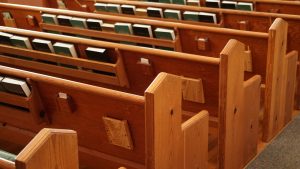
The “Jesus People” of the late sixties tried to combine the hippie lifestyle with Christianity. They found traditional worship stifling and unstructured fellowship appealing. Their motto could be “I want God in my life, but not a church.”
The movement quickly died; God without religion didn’t work. Today’s disenchanted have turned the formula around. They want religion without God. Two such organizations are “Sunday Assembly” and “Oasis.”
Secular Organizations
Both groups have similar aims and methods. They assemble on Sunday morning, to sing some songs, listen to a presentation, and discuss. They feel just like churches, but there is no God.
The secular topics would appeal to many “social justice” advocates. Their events are friendly and inclusive. Both sites feature many smiling faces and profess modernist creeds. Sunday Assembly’s motto is “Live Better, Help Often, Wonder More.” Oasis trumpets its five core values: “People are more important than beliefs. Reality is known through reason. Meaning comes from making a difference. Human hands solve human problems. Be accepting and be accepted.” One can almost hear the strains of John Lennon’s Imagine playing in the pews.
The Atlantic magazine has covered these “secular communities” on several occasions. An inherent conflict underlays these organizations. In the September 2016 issue, Isaac Anderson wrote about it, “Some secular communities seem to be negotiating between conflicting impulses: to separate from religion on the one hand, and to adopt the frameworks often associated with religion on the other. Rather than experimenting with something wholly new, they seem to be inviting nonreligious people to revise their relationships to the kinds of collective rituals they may have avoided—or felt excluded from—in the past.”
A Confused Quest for Religion
Both organizations’ sites cite religions their members left. Some express nostalgia, others defiance, and one is baffling. One Oasis “Director-at-Large” is Gretta Vosper. She worked as a minister for the United Church of Canada for three years after she “identified as an atheist.” She is also an author. The title of one of her books, Amen: What Prayer Can Mean in a World Beyond Belief speaks volumes about her confused life.
Gretta Vosper is not alone in her conflict. Jesse Hudgins‘ story, featured on Houston’s Oasis site is almost poignant. He titles his recollections, “Three Things I Miss About Being a Christian.” The first item is the music. The next echoes the title of a book popular among evangelical protestants, The Purpose Driven Life. The last is a sense of history. He still sings the religious songs in the shower. He misses having a sense of mission. He admires the history represented in the names on stained glass windows in a Catholic parish that he visited recently.
His conclusion spells out both the reason that such organizations exist and his inner conflict. “Maybe in some ways, secular communities can replace the things that I miss about religion.… For me, the cons outweigh the pros. So while I may still sing the songs, reminisce about being “on mission”, and appreciate the history, pursuing truth is far better than anything I’ve had to give up.”
Satanic Christ Porn-blasphemy at Walmart — Sign Petition
Let us pray that Mr. Hudgins finds the Truth.
Growing Pains
Despite the smiling pictures, all is not as these pseudo-rationalists would have it. For instance, on the Sunday Assembly site, there is a tab titled “Retreat to the Future.” It proclaims that the weekend experience will provide a safe space for healing, help participants find a direction, and “live your own life as fully as possible.” It is beautifully presented, complete with links to short videos about how wonderful it is. At the end of the video, there is a list of cities in which the weekend experience will be offered in 2017. The most recent offering is March of 2018, with the promise of “more dates coming soon.”
Sunday Assembly site has a similar listing of its regular get-togethers. Like the retreats, the forty-eight locations in North America contain stale links that list past happenings, promise future events or yield blank pages. The Oasis site is far smaller. It lists nine locations (four in Utah) that seem to be active. They patiently await an avalanche of people rushing to click the “Start an Oasis” tab.
How Panera’s Socialist Bread Ruined Company
The Atlantic’s most recent article, “They Tried to Start a Church Without God. For a While, It Worked,” explains the difficulty of organizing “churches” without God. The idea failed because there was little effective leadership, the constant need for novelty and the lure of finding other ways to use free time. There is no center to these gatherings that inspires people to return.
The Necessity of Grace
Churches only work when there is God, the center and purpose of all human life. As Saint Augustine says: “Thou hast made us for thyself, O Lord, and our heart is restless until it finds its rest in thee.” Thus, the Church fills a fundamental human need to gather together as a means to better know, love and serve God. This desire is so strong that even atheists feel the need to gather together and mimic the Church.
[like url=https://www.facebook.com/ReturnToOrder.org]
That is why Holy Mother has attracted people for centuries. She does not need novelties or promised experiences. A life of faith implies obligations and convictions. The Church relies upon the Grace of God, which sustains Her. Members are not part of a loose assembly of individuals but members of the Mystical Body of Christ.
The number of atheists and “nones” (those who claim no religious affiliation) is increasing. As society spins apart, some of them are trying to build a lifeboat that will help them find a way without God. May we be given the Grace to notice them and throw them a rope that will get them safely onto the Barque of Saint Peter.


